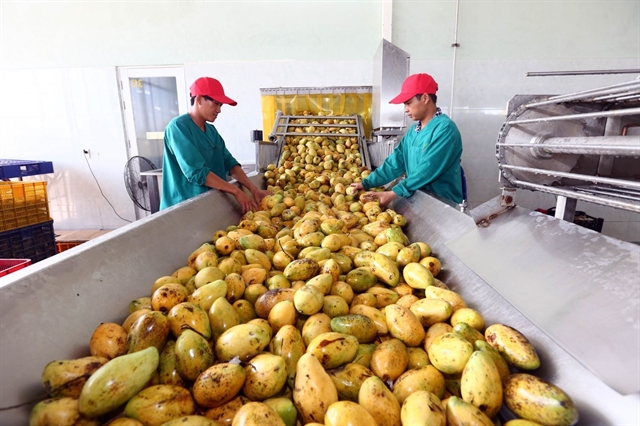The COVID-19 pandemic has impacted local agricultural products and exports, especially to China, disrupting agricultural value chains and posing risks to farming households.
According to Dr Đào Thế Anh, deputy director of the Việt Nam Academy of Agricultural Sciences, the most affected agricultural products are fresh fruits, vegetables and aquatic products.
Agriculture is also affected by diseases and natural disasters, and farmer households are most at risk, Anh said at a forum on Việt Nam’s agricultural policy in the context of the pandemic on Thursday in Hà Nội.
The pandemic not only affects farmers, small-scale producers and co-operatives but also export enterprises.
The outbreak caused a reduction of consumption because many families have had to tighten spending while goods could not be exported due to border closures, leading to the backlog, said Nguyễn Văn Thứ, director of G.C Food Joint Stock Company.
“From the beginning of this year, the company’s aloe vera products for export have decreased by 50 per cent, affecting the company’s revenue. It only achieved 70 per cent of the plan,” he said.
Regarding the impact of COVID-19, Dr Phạm Công Nghiệp from the Agricultural System Research and Development Centre said the centre’s research found agricultural value chains of some products such as black pig, ginger, banana and beef of Cao Bằng and Bắc Kạn provinces decreased by 30-77 per cent.
The selling prices of beef and banana also decreased by 21.4 per cent and 57.3 per cent, respectively.
Production costs increased by 3-25 per cent, leading to the businesses’ revenue dropping by 30-82 per cent.
The pandemic also affected production, transportation costs and caused an increase in the loss and waste of farming products, according to the research group.
The surveys also showed businesses need support in markets, inputs to production, loans, interest rate reduction, vocational training, job creation, debt payment rescheduling and financial support.
However, the agriculture industry still has opportunities amid the pandemic, according to Dr Anh.
These include increasing demand for agricultural products globally and new-generation free trade agreements such as the Comprehensive and Progressive Agreement for Trans-Pacific Partnership (CPTPP) and the EU-Việt Nam FTA.
However, the challenge is the high-quality standards from import markets.
At the forum, experts and managers proposed mechanisms, policies and solutions to promote a sustainable agricultural system.
Specifically, for production units, it is necessary to promote the application of science and technology in the processing of farming products and reduce loss and waste as well as to strengthen disease prevention and control.
The promotion of links between production and consumption of agricultural products in chains should also be strengthened to ensure product circulation and harmonious distribution of benefits between parties in the pandemic.
In addition, it is necessary to promote product consumption through new distribution channels like online sale systems.
Dr Anh suggested the State have policies to invest in science and technology to improve the efficiency of production, support small scale farmers to participate in the value chain and enhance the chain’s risk resistance capabilities.
The State also should adopt policies to strengthen the capacity of farmer households, co-operatives and businesses in the food processing industry and provide training to help farmers professionalise.
He added it is necessary to have policies to train and foster co-operative human resources, encourage and create conditions for businesses to associate with co-operatives.
Some delegates also proposed the Government, ministries and localities continue to promote solutions to create jobs after the pandemic.
Social security policies need to be implemented effectively.
The State needs to participate in the supply of essential input products for processing to ensure a stable, adequate and quality supply
